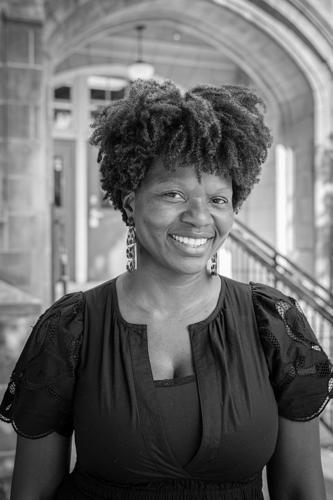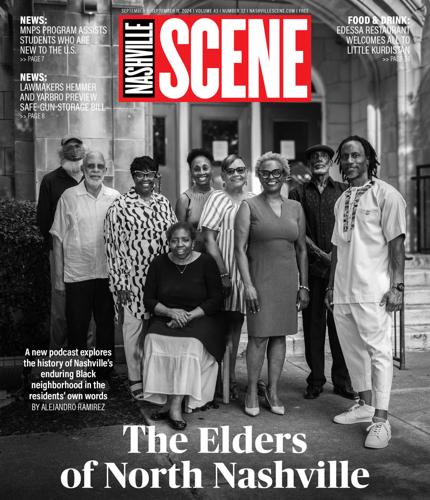Click here to jump to the first episode.
The food pantry at Watson Grove Baptist Church closes at noon, but the day is far from over for the Rev. Dr. Margreat Smithson. There are still knocks at the door and phone calls, and she might not make it to the Tuesday afternoon staff meeting — though the Scene can be blamed for the scheduling conflict.
The 76-year-old misses her old desk — a 20-year-old marvel of solid wood from her time working at General Motors — which was piled high with requests for help with rent and bills, reference letters and notices about deaths in the church community. (She’s got a new desk, and it’s clear of paperwork — for now.) That paperwork could paint a picture of all the souls who’ve come to church on DeFord Bailey Avenue seeking assistance both spiritual and material.
Smithson herself is full of stories about the North Nashville church and surrounding community. She remembers how she used to be able to walk south from her home on 14th Avenue North to a bus stop on Jefferson Street before the construction of Interstate 40 in the late 1960s cleaved her street — and the whole neighborhood — in half. The new highway displaced many North Nashville residents and throttled commerce on Jefferson Street. It changed the trajectory of a thriving Black neighborhood for decades to come.
“The interstate did do a number on us, but we survived,” Smithson tells the Scene. “And that’s what I like about North Nashville.”
A community like North Nashville has always stuck together, she says, and Watson Grove has been her home for more than 60 years. She greets strangers with hugs, and if someone asks her to pray for them, she’ll do it there on the spot. She often refers to herself as just a reverend.
Smithson worries that as new buildings go up and newcomers move in nearby, the folks she works with will get more scattered. But she doesn’t think the kind of help the community seeks has changed much. “Maybe it’s expanded, but it hasn’t changed,” she says.
M. Simone Boyd, a local storyteller, artist, activist and occasional Scene contributor, coaxes more stories from Smithson. Sometimes Boyd, who attends services at Watson Grove, seems like a granddaughter eager to hear another story of days gone by; other times, it’s clear she’s urging Smithson to not be so humble, to not undersell her own accomplishments, to use her full title of “reverend doctor.” Boyd mentions that just a few nights ago Smithson was out by herself picking up groceries to help some unhoused neighbors.

M. Simone Boyd
“You run your mouth too much!” Smithson says, and the two erupt in laughter. The scolding is playful, but it does hint at the reverend doctor’s blend of compassion and firmness. Smithson adds that one of her children was “probably” with her for the grocery run.
“I think God sent her my way because she fusses at me a lot,” Smithson says about Boyd. “She will tell me things that I’m doing, and … it’s not monumental, but she keeps reminding me that it’s helping somebody else.”
Smithson’s work hasn’t gone unnoticed. In mid-August she received a clear glass trophy commemorating her work as a co-founder of Suicide Prevention in the African American Faith Community Coalition.
Boyd has been gathering stories from people like Smithson — elders of the North Nashville community — for months now. The result is a five-episode podcast series titled We Are North Nashville, which premieres Sept. 5. Boyd co-hosts alongside reporter, producer and engineer Andrea Tudhope.
“These are the people who knit our community and our society together, and I think it’s really important to celebrate them while they are here,” says Boyd.
Boyd is invested in North Nashville’s smallest details and biggest projects. When she noticed the awning outside the senior center at Elizabeth Park was in disrepair, she sent email after email to the city agitating to get it replaced. She headed up an art installation at the senior center honoring several Black women who have been integral to the North Nashville community. Just a few blocks away, she helped bring a public art installation to the I-40 underpass at Arthur Avenue, which also meant repairs to that section of the highway. She’s also a novelist, speaker and all-around community advocate. But a podcast like We Are North Nashville is new territory.
The podcast began shortly after the death of Boyd’s mother-in-law in 2023 — and the ensuing realization that Boyd wanted to hold onto the stories that other elders in her life had to share before it was too late. She reached out to journalists Tudhope and Steve Haruch, both formerly producers of the WPLN daily show This Is Nashville and now part of the Nashville Banner team, though the project is separate from the recently revived outlet. (Haruch was also once an editor at the Nashville Scene.) The trio began meeting with North Nashville elders, some of whom had never been interviewed before, and asking them about the decades they’ve spent living in the community. They recorded stories about segregation, scenes of family life in North Nashville and memories of old businesses like the Ritz Theater on Jefferson Street.
Boyd says that, unlike with a traditional news project, the elders were involved in several “decision points” about the podcast, and the team sought feedback from the elders every few months. The goal was to let the subjects drive the podcast and keep them involved in the project from start to finish — rather than having the show’s producers parachute in and out of North Nashville like so many other reporters have over the years. Boyd is also a character of the podcast in the way, seeking stories and conversations with people she knows or has just met.
“I don’t really see myself as a journalist,” she says. “I kind of see myself just as a neighbor, and I have a certain skill set that I’m using in service to my community.”
The team also secured financial support from The Frist Foundation, Just Economy Institute, the Tennessee Arts Commission and more. A launch party at the Frist Art Museum is planned for Sept. 5, emceed by Nashville-based poet Ciona Rouse.
As the project neared its conclusion in mid-August, the team hosted a dinner at the Germantown Inn for the nine elders they spoke to for the podcast, as well as other members of the community. They also previewed the podcast by playing snippets of a few of the interviews.
In one clip, sisters Leitha Carter and Barbara Jean Watson recall memories of their family home and a big kettle in the backyard that was used for making soaps and lotions, comparing it to a witch’s cauldron.
“Yeah there’s been some bad, but there’s been a lot of good,” says Thomas Wilson in another recording. “And that is reflected in the resilience of the people who are still there. And it needs to be pointed out, too, the things that were done to North Nashville, to sacrifice that part of Nashville in the name of progress.”
At the dinner table, Dr. Patricia Streator Jackson and Larry Turnley Sr. reminisce about their old North Nashville neighborhood, sharing memories about playing outside near Tennessee State University and listening to the historically Black school’s band practice. Streator Jackson remembers celebrating a birthday at The Fairgrounds Nashville after it had been desegregated. Turnley remembers how Streator Jackson’s father, a professional photographer, would take pictures of various childhood celebrations. Turnley shares with a younger attendee how he got his nickname “Fever” on the basketball court: “Once I got hot, they couldn’t stop me!”
They’re eager to share stories about old neighbors and brag about their kids. The elders say they want people to know there’s more to the community than just crime. (A study found that the 37208 ZIP code sees the highest rate of incarceration in the country, which has also inspired projects to invest in and empower North Nashville residents.) North Nashville is also changing, with more upper-class white people moving in. Some of the elders still own homes in the community. Turnley’s son Larry Jr. owns property in North Nashville and says it’s an important way to secure a place in the community for his children.
An audio clip of Cheryl McReynolds played at the dinner mentions that point too.
“I pray that my daughter will continue to hold this spot,” she says. “It was meant for us to be here. My parents purchased this spot and not even knowing what the future was holding, that times would change like it would. ... And people tell me all the time, ‘Girl, you on a gold mine! You got a gold mine!’ But before, y’all used to say this was on the terrible side of town.”
Boyd knows new people and new developments will arrive. You can’t completely stop change. But she hopes newcomers will learn about the neighborhood and come to recognize and respect what was here before their new home was even built. Boyd is open about the political-minded aims of the project, the way it critiques land-grabs, discrimination and oppression. But there’s an emotional center to it all.
Boyd ends the evening in Germantown by reading a few lines from acclaimed Black feminist author bell hooks’ “Love as the Practice of Freedom,” an essay that makes the case for including love as part of the progressive movement.
“Without love, our efforts to liberate ourselves and our world community from oppression and exploitation are doomed,” writes hooks. “A love ethic emphasizes the importance of service to others.”
Parts of We Are North Nashville will show a time when a Black neighborhood was torn asunder to make commuting to work and to malls and to outlying lily-white suburbs easier. It’ll show life under segregation. But it’s also an act of service to an often misrepresented community and a love letter to the enduring people of North Nashville.
Listen to the first episode of We Are North Nashville below.










